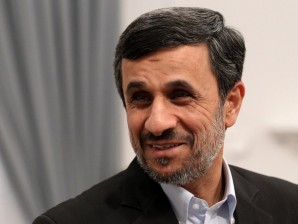Economy, nuclear top agenda as Iran elects president
TEHRAN – Iran elects on Friday a successor to President Mahmoud Ahmadinejad, whose eight years in office have been marked by stiff Western sanctions over Tehran’s controversial nuclear drive and the economic turmoil they have caused.
When Ahmadinejad was re-elected for a second term in 2009, widespread charges of voter fraud sparked massive street protests.
Suppressed by a brutal state crackdown, those protests plunged Iran into its worst crisis since the establishment of the Islamic republic in 1979.
The Guardians Council, an unelected vetting body, approved only eight men out of 686 hopefuls to stand in the election, and the list is dominated by conservatives close to supreme leader Ayatollah Ali Khamenei.
That fits with Khamenei’s desire for “an orderly, calm and undisputed election,” said Alireza Nader, a researcher at the RAND Corporation, the American policy research institute.
At the forefront of a Western confrontation with Iran over its nuclear program, the United States and France have denounced the “lack of transparency” in the campaign.
Akbar Hashemi Rafsanjani, a prominent figure in the Iranian revolution who served as president from 1989 to 1997, was surprisingly barred from running, as was Esfandiar Rahim Mashaie, a divisive figure close to the incumbent.
Considered a would-be favorite by marginalized reformists and moderates, Rafsanjani, 78, has lost much of his political stock in recent years and fallen out with Khamenei.
“Between an open ballot and ‘zero risk’, the supreme leader made his choice,” said a Western diplomat in Tehran.
The candidate list consists of five conservatives, including top nuclear negotiator Saeed Jalili, former foreign minister Ali Akbar Velayati and Tehran mayor Mohammad Baqer Qalibaf.
Two contenders, ex-chief nuclear negotiator Hassan Rowhani and Mohammad Reza Aref, an ex-first vice president, are appealing to the moderate and reformist bases.
Ahmadinejad himself is barred by the constitution from running for a third term.
Three live televised debates with a tightly controlled format failed to ignite the lackluster campaign, and were criticized by both viewers and participants.
Public, open-air rallies are banned, and campaign posters are mostly absent across the country.
Mir Hossein Mousavi and Mehdi Karroubi, leaders of the 2009 protests who have remained under house arrests for more than two years, have cast a long shadow over the campaign. Their faces have appeared on some posters at a few rallies, where supporters chanted slogans demanding their release.
On Tuesday, Khamenei called on Iranians to get out and vote in numbers, saying a high turnout would foil foreign attempts to undermine the election. However, most of the 50.5 million voters are more concerned about the dire state of the economy.
Iran is staggering under the weight of repeated rounds of international sanctions — targeting oil exports and access to the global banking system — over its disputed nuclear program.
The West fears Iran is seeking to develop atomic weapons, a claim Tehran hotly denies.
Over several years of negotiations, Western powers have failed so far to convince Iran to cut back its nuclear program.
And parallel efforts by the UN’s International Atomic Energy Agency have failed to shed light on the intent of Tehran’s atomic activities.
Some candidates and critics have blamed Jalili’s tough stance for the failure of the talks.
Tehran insists its civilian nuclear program is for peaceful power generation and medical purposes only, denying any deviation towards military objectives.
Khamenei, who has the final say in the Islamic republic’s affairs, has repeatedly said “using weapons of mass destruction, including nuclear (arms), is haram (religiously forbidden).”
The nuclear program has already cost Tehran “well over $100 billion measured in lost oil revenue and foreign investments,” said Karim Sadjadpour, an expert from the Carnegie Institute for International Peace.
Oil exports plummeted by 40 percent in 2012 due to the sanctions, which have also complicated the repatriation of petrodollars, valued at nearly $5 billion a month.
Inflation is officially running at more than 30 percent and Iran’s currency, the rial, has lost around 80 percent of its value since early 2012.
According to an industry professional, the price of a household’s “basket of goods” has increased by 63 percent over the past year, with the cost of some basic commodities having doubled.
While sanctions are blamed for most problems by the government, critics also accuse Ahmadinejad of mismanagement in dealing with the effects of the punitive measures.
Another thorny issue is Iran’s support for the regime of Syrian President Bashar al-Assad that has exacerbated already-tense relations with world powers.
Tehran has stood by Assad as he battles rebels seeking to topple him and is accused by Western and Arab governments of supplying weapons and military forces to Syria along with its Lebanese Shiite ally, Hezbollah.
Experts doubt the next president will have any margin of maneuver on Syria or on diplomacy with Iran’s arch-foe, the United States, over the nuclear issue.
Such issues “will continue to be controlled by the supreme leader’s office and the Revolutionary Guards,” said Afshon Ostovar, an analyst with the US research center CNA.
“If the next president is able and willing, he should also put pressure on the regime to make some concessions on the nuclear issue to help improve economic matters,” he said. “But it is doubtful that any of the candidates will be in a position to do this or would be willing to take that risk.”















